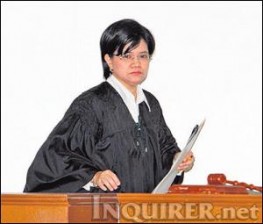
Judge Jocelyn Solis-Reyes. FILE PHOTO
MANILA, Philippines—A Quezon City court has denied a petition by one of the accused in the Maguindanao massacre case who asked that the charges against him be dropped because he had been mistaken by the authorities for someone else.
In an eight page ruling, Judge Jocelyn Solis-Reyes of Branch 221 of the Quezon City Regional Trial Court, denied the twin pleadings Datukan Malang Salibo — one seeking to quash an arrest warrant and jail commitment order, and the other seeking the dropping of multiple murder charges— for lack of merit.
The judge also set the accused’s arraignment on 58 counts of murder on June 26 at the Quezon City Jail Annex in Camp Bagong Diwa, Bicutan in Taguig City.
Salibo, one of the 195 held to account for the November 23, 2009 Maguindanao massacre, claimed to be a victim of mistaken identity, saying he was not the Butukan S. Malang named on the charge sheet.
The accused said he was on a pilgrimage to Saudi Arabia from November 7 to December 19, 2009 and that it was impossible for him to have been involved in the carnage.
In denying Salibo’s appeal, the court noted that while Salibo’s name does not appear on the charge sheet, that name was indicated as Malang’s alias in the return of the arrest warrant and the commitment order.
Reyes added that fellow accused PO1 Pia Kamidon had testified that Salibo was with primary accused Andal Ampatuan Sr. at the time of the massacre, which became the basis of the charges against Salibo.
“The court has been consistent with its ruling that whether or not the true or correct name of the accused was indicated in the information, for as long as there is positive identification made that the person named allegedly perpetrated the crime charged, the information is sufficient in form,” the ruling stated.
The judge, citing Supreme Court rulings, added that a mistake in the accused’s name does not necessarily mean a mistake in his identity.
A Pasig City court issued a writ of habeas corpus in Salibo’s favor in October 2010 but this was reversed by the Court of Appeals in April 2011.
Salibo claimed he was on a pilgrimage at the time of the massacre and presented plane tickets and photographs as proof.
The judge said, however, that his defense of alibi should be “discussed in a full-blown trial instead of a preliminary hearing for the resolution of a motion to quash.”